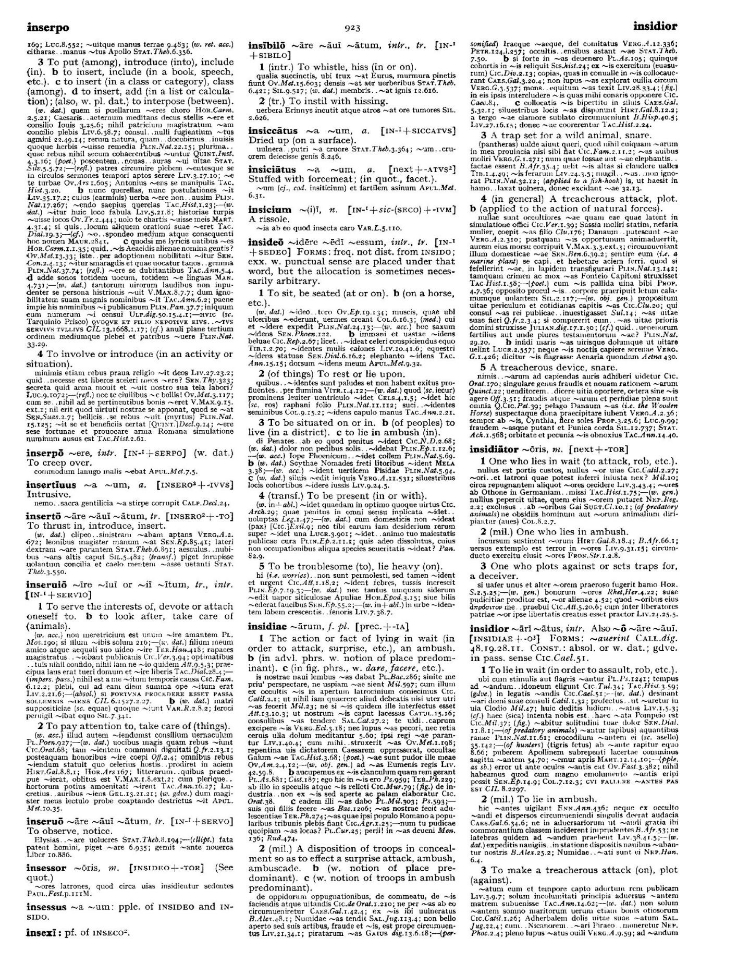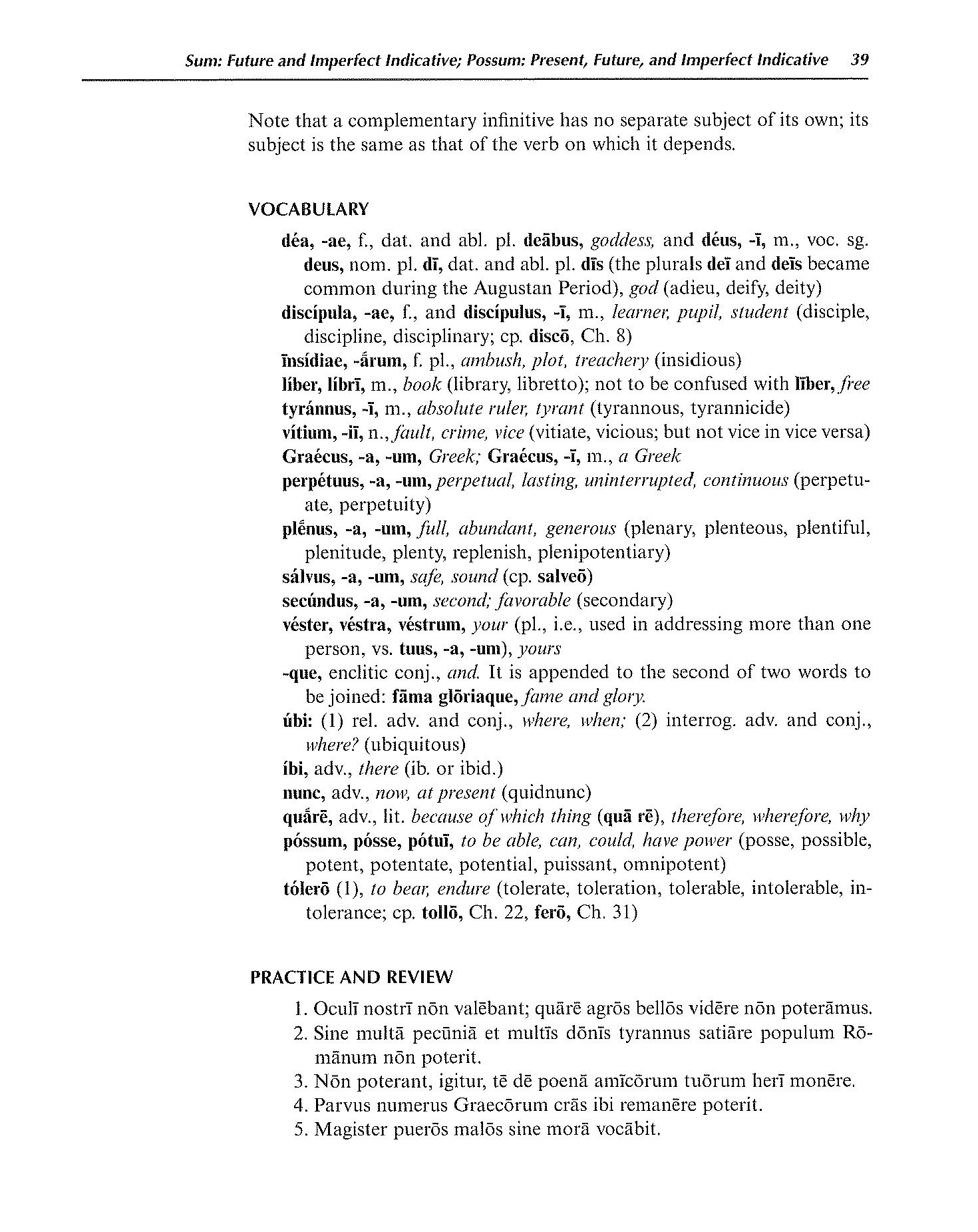
page_listing.tpl
page_subListingDetails.tpl
sub_listingDetails_style1.tpl
sub_listingDetails.title.tpl
īnsidiae treachery
īnsidiae is a Latin Noun that primarily means treachery.
Definitions for īnsidiae
Wheelock's Latin
Noun
- 1
ambush, plot, treachery
English derivatives:
insidious
Oxford Latin Dictionary
Noun
- 1
The action of fact of lying in wait (in order to attack, suprise, etc.), an ambush.
- 2
(mil.) A disposition of troops in concealment so as to effect a surprise attack, ambush, ambuscade. (b) (w. notion of place predominant). (c) (w. notion of troops in ambush predominant).
- 3
A trap set for a wild animal, snare.
Sentences with īnsidiae
Latin to English
Īnsidiās tyrannī nōn tolerābās.Compare You (sg.) were not tolerating (did not tolerate) the treachery of the tyrant.
Nōn sōlum mōrēs sed etiam īnsidiās illīus laudāre audēs.Compare You (sg.) dare to praise not only the character but also the treachery of that man.
Propter īnsidiās enim ūnīus hominis haec cīvitās nōn valēbat.Compare In fact, on account of the treachery of one man this state was not strong.
Vīribus hominum nōn dēlēmur; sed possumus īnsidiīs dēlērī.Compare We are not being destroyed by the strength of men, but we can be destroyed by a plot.
Cum cōnsilia tua nunc comprehendāmus, īnsidiās tuās nōn ferēmus.Compare Since we now understand your plans, we will not endure your treachery.
Catilīna (= Catiline), quī tantās īnsidiās contrā rem pūblicam fēcerat, ex urbe ā Cicerōne expulsus est.Compare Catiline, who had made such a great plot against the state, was driven from the city by Cicero.
Paratae lacrimae insidias non fletum indicant.Compare Ready tears are a sign of treachery, not of grief.
Vigilandum est semper; multae insidiae sunt bonis.Compare One must always be on one's guard: there are many snares for the good.
Declension table for īnsidiae
Cactus2000
| Singular | Plural | |
| Nom. | - | īnsidiae |
| Gen. | - | īnsidiārum |
| Dat. | - | īnsidiīs |
| Acc. | - | īnsidiās |
| Abl. | - | īnsidiīs |
Data sources
Notes
- Definitions
- Frederick M. Wheelock, Wheelock's Latin, 6th ed., rev. Richard A. LaFleur (New York, NY: HarperCollins Publishers, 2005): 39.
- P. G. W. Glare, Oxford Latin Dictionary, Vols. 1-8 (Oxford: Clarendon Press, 1982): 923.
- Word frequencies
- Paul B. Diederich, The Frequency of Latin Words and Their Endings, PhD diss., (Columbia University, 1939).
- Louis Delatte, Suzanne Govaerts, Joseph Denooz, and Etienne Evrard, Dictionnaire fréquentiel et index inverse de la langue latine [Frequency Dictionary and Inverse Index of the Latin Language] (Liège, Belgium: Laboratoire d'analyse statistique des langues anciennes de l'Université de Liège [L.A.S.L.A.], 1981): 125.
Bibliography
Allen, Joseph H. Allen and Greenough's New Latin Grammar for Schools and Colleges: Founded on Comparative Grammar. Edited by James B. Greenough, George L. Kittredge, Albert A. Howard, and Benjamin L. D'Ooge. Boston, MA: Ginn & Company, 1903.
Crystal, David. A Dictionary of Linguistics and Phonetics. 6th ed. Oxford, UK: Blackwell Publishing, 2008.
Delatte, Louis, Suzanne Govaerts, Joseph Denooz, and Etienne Evrard. Dictionnaire fréquentiel et index inverse de la langue latine [Frequency Dictionary and Inverse Index of the Latin Language]. Liège, Belgium: Laboratoire d'analyse statistique des langues anciennes de l'Université de Liège (L.A.S.L.A.), 1981.
Diederich, Paul B. The Frequency of Latin Words and Their Endings. PhD diss., Columbia University, 1939.
Francese, Christopher. "Latin Core Vocabulary." Dickinson College Commentaries. Last modified 2014. http://dcc.dickinson.edu/latin-vocabulary-list.
Gildersleeve, Basil L., and Gonzales Lodge. Gildersleeve's Latin Grammar: Third Edition, Revised, and Enlarged. 3rd ed. London, England: Macmillan and Co., 1903.
Glare, Peter G.W. Oxford Latin Dictionary. Vols. 1-8. Oxford, England: Clarendon Press, 1982.
Krüger, Bernd. "Latin Conjugation Tables." Cactus2000. Accessed May 5, 2023. https://latin.cactus2000.de/index.en.php.
Pierson, Nick. "Sound of Text." Accessed October 26, 2019. https://soundoftext.com.
Wheelock, Frederick M. Wheelock's Latin. 6th ed. Revised by Richard A. LaFleur. New York, NY: HarperCollins Publishers, 2005.
Wiktionary Contributors. "Victionarium." Wikimedia Foundation, Inc. Updated March 18, 2019. https://la.wiktionary.org/wiki/Victionarium:Pagina_prima.
Citation
Chicago (17th ed.)
Allo Contributors. "īnsidiae, īnsidiārum (n.) - Latin Word Definition." Allo Latin Dictionary. Last modified . Accessed February 20, 2026. http://ancientlanguages.org/latin/dictionary/insidiae-insidiarum.
Entry created on . Last updated on .







